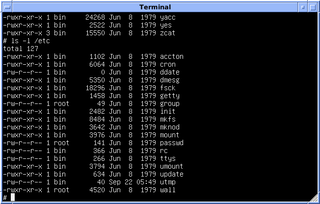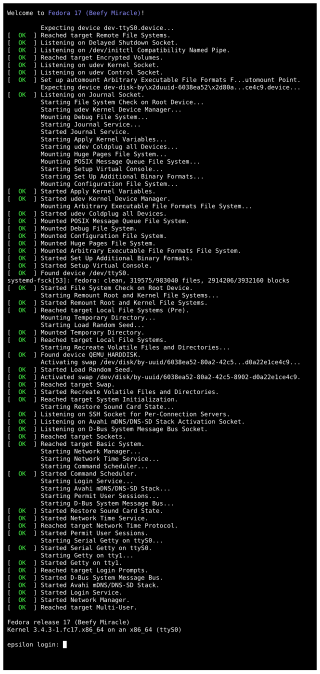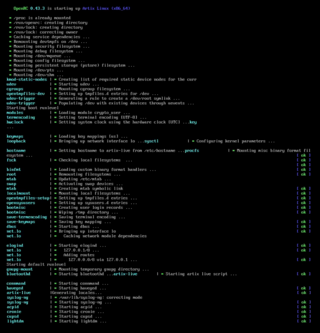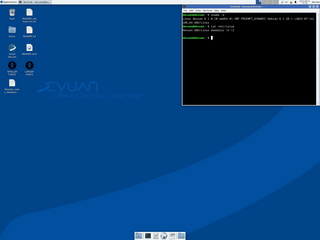
GNU Hurd is a collection of microkernel servers written as part of GNU, for the GNU Mach microkernel. It has been under development since 1990 by the GNU Project of the Free Software Foundation, designed as a replacement for the Unix kernel, and released as free software under the GNU General Public License. When the Linux kernel proved to be a viable solution, development of GNU Hurd slowed, at times alternating between stasis and renewed activity and interest.

A Linux distribution is an operating system made from a software collection that includes the Linux kernel, and often a package management system. Linux users usually obtain their operating system by downloading one of the Linux distributions, which are available for a wide variety of systems ranging from embedded devices and personal computers to powerful supercomputers.

Free and Open source Software Developers' European Meeting (FOSDEM) is a non-commercial, volunteer-organized European event centered on free and open-source software development. It is aimed at developers and anyone interested in the free and open-source software movement. It aims to enable developers to meet and to promote the awareness and use of free and open-source software.
A runlevel is a mode of operation in the computer operating systems that implements Unix System V-style initialization. Conventionally, seven runlevels exist, numbered from zero to six. S is sometimes used as a synonym for one of the levels. Only one runlevel is executed on startup; run levels are not executed one after another.
Technical variations of Linux distributions include support for different hardware devices and systems or software package configurations. Organizational differences may be motivated by historical reasons. Other criteria include security, including how quickly security upgrades are available; ease of package management; and number of packages available.

In Unix-based computer operating systems, init is the first process started during booting of the operating system. Init is a daemon process that continues running until the system is shut down. It is the direct or indirect ancestor of all other processes and automatically adopts all orphaned processes. Init is started by the kernel during the booting process; a kernel panic will occur if the kernel is unable to start it, or it should die for any reason. Init is typically assigned process identifier 1.
HAL is a software subsystem for UNIX-like operating systems providing hardware abstraction.
Upstart is a discontinued event-based replacement for the traditional init daemon—the method by which several Unix-like computer operating systems perform tasks when the computer is started. It was written by Scott James Remnant, a former employee of Canonical Ltd. In 2014, Upstart was placed in maintenance mode, and other init daemons, such as systemd, were recommended in place of Upstart. Ubuntu moved away from Upstart with the release of version 15.04 in favor of migrating to systemd. As of March 2023, there have been no updates released for Upstart since September 2014.
The multi-stage booting process of Linux is in many ways similar to the BSD and other Unix-style boot processes, from which it derives.

WeeChat is a free and open-source Internet Relay Chat client that is designed to be light and fast. It is released under the terms of the GNU GPL-3.0-or-later and has been developed since 2003.

Linux-libre is a modified version of the Linux kernel that contains no binary blobs, obfuscated code, or code released under proprietary licenses. In the Linux kernel, they are mostly used for proprietary firmware images. While generally redistributable, binary blobs do not give the user the freedom to audit, modify, or, consequently, redistribute their modified versions. The GNU Project keeps Linux-libre in synchronization with the mainline Linux kernel.
Process supervision is a form of operating system service management in which some master process remains the parent of the service processes.

systemd is a software suite that provides an array of system components for Linux operating systems. The main aim is to unify service configuration and behavior across Linux distributions. Its primary component is a "system and service manager" – an init system used to bootstrap user space and manage user processes. It also provides replacements for various daemons and utilities, including device management, login management, network connection management, and event logging. The name systemd adheres to the Unix convention of naming daemons by appending the letter d. It also plays on the term "System D", which refers to a person's ability to adapt quickly and improvise to solve problems.

lzip is a free, command-line tool for the compression of data; it employs the Lempel–Ziv–Markov chain algorithm (LZMA) with a user interface that is familiar to users of usual Unix compression tools, such as gzip and bzip2.

OpenRC is a dependency-based init system for Unix-like computer operating systems. It was created by Roy Marples, a NetBSD developer who was also active in the Gentoo project. It became more broadly adopted as an init system outside of Gentoo following the decision by some Linux distributions not to adopt systemd.

musl is a C standard library intended for operating systems based on the Linux kernel, released under the MIT License. It was developed by Rich Felker with the goal to write a clean, efficient, and standards-conformant libc implementation.

GNU Guix is a functional cross-platform package manager and a tool to instantiate and manage Unix-like operating systems, based on the Nix package manager. Configuration and package recipes are written in Guile Scheme. GNU Guix is the default package manager of the GNU Guix System distribution.

Devuan is a fork of the Debian Linux distribution that uses sysvinit, runit or OpenRC instead of systemd. Devuan aims to avoid "lock-in" by projects like systemd and aims to maintain compatibility with other init systems to avoid detaching Linux from other Unix systems.

GNU Guix System or Guix System is a rolling release, free and open source Linux distribution built around the GNU Guix package manager. It enables a declarative operating system configuration and allows system upgrades which the user can rollback. It uses the GNU Shepherd init system and the Linux-libre kernel, with support of the GNU Hurd kernel under development. On February 3, 2015, the Free Software Foundation added the distribution to its list of endorsed free Linux distributions. The Guix package manager and the Guix System drew inspiration from and were based on the Nix package manager and NixOS respectively.













